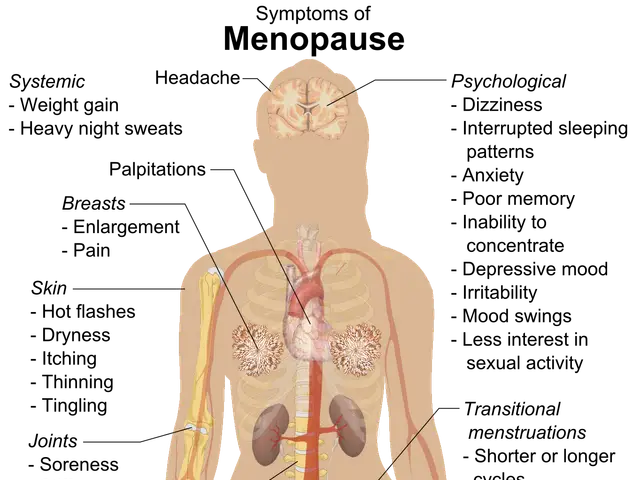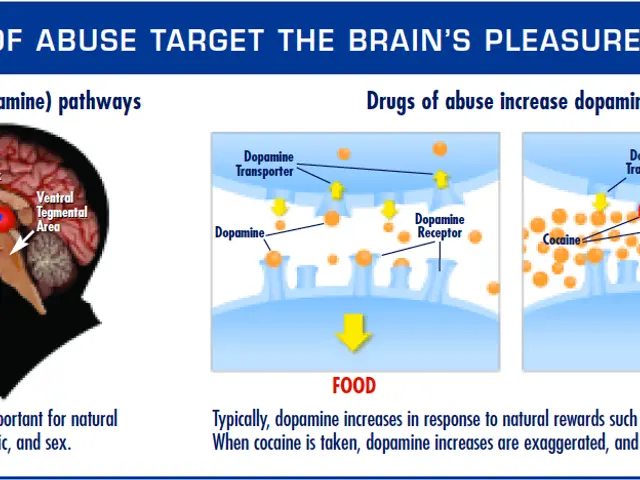Heat-induced malfunctions of cardio-protective medications
In a recent study led by Dr. Kai Chen of the Yale School of Public Health, a connection has been found between hot-weather heart attacks and the use of either aspirin or beta-blockers, common medications used to prevent heart attacks and manage heart disease.
Beta-blockers, which are used to regulate blood pressure and heart rate, can pose a particular risk during hot weather. These medications reduce blood flow to the skin, impairing the body's ability to cool itself through heat dissipation. This can increase the risk of overheating in hot weather. As the heart works harder to regulate body temperature in extreme heat, beta-blockers can heighten vulnerability to heat stress and related cardiovascular strain, potentially increasing the risk of heart attack during heatwaves.
Heat exposure combined with beta-blockers may also worsen heat intolerance, making it more difficult for the body to maintain safe temperature and blood pressure levels.
On the other hand, aspirin, a blood thinner used to reduce the risk of heart attacks and strokes by preventing blood clots, can also pose risks during hot weather. In hot weather, the blood tends to become thinner, and aspirin's blood-thinning effect can increase sensitivity to temperature extremes, affecting how the body manages heat stress and increasing potential complications relating to clotting and bleeding.
The study, which analysed nearly 2500 cases of non-fatal heart attacks during the summer months, found that both aspirin use and beta-blockers were associated with a significantly higher risk of heart attack. Aspirin use was associated with a 63% higher risk, and beta-blockers with a 65% higher risk.
To manage these risks, patients on these medications are advised to stay hydrated, avoid peak heat hours (between noon and 3 pm when the sun is at its strongest), use air conditioning, wear breathable clothing, and consult doctors about their medication regimen to possibly adjust doses or take additional precautions.
The study did not investigate the reasons for this increased risk, but it did find that heat exposure on the day of a heart attack was significantly higher compared to the "control" days. Younger patients (ages 25 to 59 years) who took these drugs had a higher risk of heart attack than older patients (60 to 74 years) who did not.
In summary, both beta-blockers and aspirin can potentially elevate heart attack risk during hot weather. Careful management and preventive measures are essential for patients using these drugs in extreme heat conditions. The takeaway: patients taking these two medications should take precautions during heat waves, such as avoiding the heat and spending more time indoors. It's also important to remember that aspirin, used to reduce heart attack risk, can also increase heart attack risk during hot weather.
- The science behind brain health suggests that hot weather could potentially exacerbate the risks associated with certain medical-conditions, such as cardiovascular health, due to the implications of using medications like aspirin and beta-blockers.
- In addition to cardiovascular health, the study shows a connection between heat and mental-health, with younger patients on these medications having a higher risk of heart attack during hot weather.
- Health-and-wellness professionals stress the importance of maintaining proper nutrition, fitness-and-exercise routines, and environmental-science awareness while managing medical-conditions during extreme heat, as these factors can impact heart attack risk.
- Climate change is becoming increasingly relevant in the discussion about heart attack risk, with researchers warning that heatwaves could become more frequent and intense, posing new challenges for those using beta-blockers and aspirin.
- In the bigger picture, it's crucial to prioritize overall health and wellness, ensuring that everyone is equipped with knowledge about the potential risks associated with medications and hot weather, enabling them to take preventive measures and maintain optimal brain, mental, and cardiovascular health.





